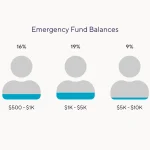
Financial literacy refers to the knowledge necessary for making informed money decisions that lead to greater monetary stability and reduced stress levels. This encompasses budgeting, saving, debt management and retirement planning as well as understanding credit and investment products.
Becoming financially literate also involves knowing how to establish an emergency savings account and avoid debt by choosing loan terms that offer the best terms, paying balances early, and creating an effective repayment plan.
Learn the Basics
Many Americans find the complexity of financial matters confusing and disempowering, leading them to feel powerless over their finances and leading them down a path of anxiety regarding money matters. Increased financial literacy may help individuals make wiser choices with their hard-earned dollars – such as keeping an eye on bank and credit card accounts to detect possible fraud quickly or creating an emergency fund to prevent debt accumulation when unexpected expenses arise.
Becoming financially literate begins with learning the fundamentals of personal finance management, such as budgeting, paying off debts, saving and investing. Financial literacy also involves understanding long-term consequences of decisions such as selecting a retirement plan with company matching contributions or diversifying investment risk for better risk mitigation. Acquiring these skills promotes financial self-sufficiency, stability and well-being.
Create a Budget
Budgeting is a financial planning tool that allows you to gain clarity into where and how your money is being spent. A budget provides valuable insight into where it goes – providing clarity as to where and what spending occurs in real-time.
Setting and adhering to a budget may seem like an intimidating task at first, but it’s an integral component of taking greater control of your finances. A budget helps prioritize spending, pay down debt more quickly, save more and meet long-term financial goals.
Start by collecting all your personal income sources (full-time jobs and side gigs), expenses, savings accounts and seasonal or semi-annual spending such as car or home insurance policies. There are various tools and techniques available to you for creating and sticking to a budget tailored specifically to you.
Set Financial Goals
Understanding financial concepts like budgeting, saving and debt management enables individuals to set realistic financial goals. They can plan to meet short-term and long-term financial goals such as buying a house or car, clearing debts or saving for retirement.
Loan, credit card and investment decisions should be carefully considered with care to avoid predatory lenders and protect oneself by knowing how to recognize red flags.
Financially literate individuals can put their knowledge of personal finance to good use by creating an emergency fund of three to six months worth of expenses and using savings to pay down debts. Such personal finance knowledge helps people feel more in control and confident with their money, leading to increased life satisfaction and contributing to a stronger economy as a result. Additionally, they may use this financial literacy for supporting family and community needs, strengthening economies across the board.
Make a Plan to Get Out of Debt
Today’s ever-complex American economy requires individuals to gain a thorough understanding of how their financial decisions impact their lives, from budgeting and saving to wise investing and retirement income planning. Furthermore, understanding your options such as mortgages, health insurance plans, student loans and self-directed investment products are important aspects of living an optimal lifestyle.
Jane is struggling with financial literacy issues, making it easy for her to rack up unmanageable levels of debt that damage both her credit score and overall financial situation. Additionally, her inability to properly manage both her debt and savings compound her challenges further, including failing to pay her mortgage payments on time.
Financially literate individuals are better equipped to make informed and appropriate decisions in light of current and projected economic trends, and can assess tradeoffs between various credit and savings/investment products.
Invest
Financial literacy helps you save and invest wisely – essential elements in building wealth. Financial literacy teaches how to develop a budget, pay off debt and set financial goals.
Financially literate individuals can more easily navigate specific financial challenges, such as car repairs and health emergencies. By tapping their emergency savings or subscription to insurance coverage instead of incurring credit card debt or running out of funds between paychecks, financial literacy gives the edge needed to overcome specific roadblocks more easily.
At a time when financial illiteracy remains widespread, personal finance education should become a top priority. Schools, libraries and banks like CBC provide community-focused financial education programs which you can take advantage of; you may also consider networking with peers who share experiences on how best to manage finances.



